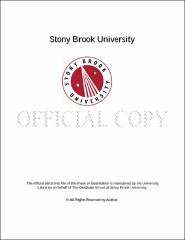| dc.identifier.uri | http://hdl.handle.net/11401/76830 | |
| dc.description.sponsorship | This work is sponsored by the Stony Brook University Graduate School in compliance with the requirements for completion of degree. | en_US |
| dc.format | Monograph | |
| dc.format.medium | Electronic Resource | en_US |
| dc.language.iso | en_US | |
| dc.publisher | The Graduate School, Stony Brook University: Stony Brook, NY. | |
| dc.type | Dissertation | |
| dcterms.abstract | With the widespread adoption of advanced information and communication technologies, the past decade has witnessed a proliferation of online organizations that aim to create public goods through voluntary collaboration among self-organized, networked individuals. This form of online collective action has been termed peer production. One of the most successful examples of peer production, and the most widely studied, is the free online encyclopedia Wikipedia, which is written in a collaborative fashion by hundreds of thousands of volunteers and used by millions of people daily. In this dissertation, I use Wikipedia as a strategic case site to critically reflect on the state of our knowledge about how peer production works and to develop a series of empirical studies that offer insights into several puzzles in the literature. These include questions of what motivates participation in online collectives, how emergent organizational structures shape patterns of participation, and how interactional aspects of participation relate to characteristics of the goods being produced. In each case, I argue that we must take into account - both theoretically and methodologically - the high degree of inequality in participation that we commonly see in such organizations. My findings reveal insights about the origins as well as consequences of participation inequality. | |
| dcterms.available | 2017-09-20T16:51:15Z | |
| dcterms.contributor | van de Rijt, Arnout | en_US |
| dcterms.contributor | Schwartz, Michael | en_US |
| dcterms.contributor | Roxborough, Ian | en_US |
| dcterms.contributor | Grim, Patrick. | en_US |
| dcterms.creator | Restivo, Michael Andrew | |
| dcterms.dateAccepted | 2017-09-20T16:51:15Z | |
| dcterms.dateSubmitted | 2017-09-20T16:51:15Z | |
| dcterms.description | Department of Sociology. | en_US |
| dcterms.extent | 121 pg. | en_US |
| dcterms.format | Application/PDF | en_US |
| dcterms.format | Monograph | |
| dcterms.identifier | http://hdl.handle.net/11401/76830 | |
| dcterms.issued | 2014-12-01 | |
| dcterms.language | en_US | |
| dcterms.provenance | Made available in DSpace on 2017-09-20T16:51:15Z (GMT). No. of bitstreams: 1
Restivo_grad.sunysb_0771E_11821.pdf: 1662668 bytes, checksum: 349728aef12ca314fdd2a750fe7b951e (MD5)
Previous issue date: 1 | en |
| dcterms.publisher | The Graduate School, Stony Brook University: Stony Brook, NY. | |
| dcterms.subject | diversity, gender, organizations, peer production, social rewards, wikipedia | |
| dcterms.subject | Sociology | |
| dcterms.title | Why Wiki Works: Peer Production and Making Knowledge the Wiki Way | |
| dcterms.type | Dissertation | |

